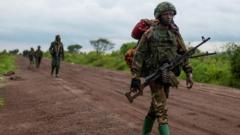In the latest developments from eastern Democratic Republic of Congo (DRC), the M23 rebel group, reportedly backed by Rwanda, has successfully captured the strategically important town of Masisi. This seizure marks the second town claimed by the rebels in just two days, further demonstrating their increasing influence in the mineral-rich North Kivu province. The M23's incursions have caused widespread displacement, forcing hundreds of thousands of Congolese citizens to flee their homes since the group began its resurgence in 2021.
Local officials and community members have expressed alarm over the situation, with Alexis Bahunga from the North Kivu provincial assembly stating that the capture of Masisi contributes to a grave humanitarian crisis in the region. Amidst the turmoil, there have been calls for the DRC government to enhance its military capabilities to counter the growing threat from the M23 insurgents.
As the conflict escalates, Angola has attempted to facilitate dialogue between the DRC's President, Félix Tshisekedi, and Rwandan President, Paul Kagame, but previous talks stalled last month. The local populace remains concerned, with accounts emerging of the M23 holding community meetings to assert their presence as liberators.
Current reports from the conflict zone indicate a peaceful atmosphere in Masisi following the capture, although casualties from clashes between the M23 and governmental forces have yet to be confirmed. Masisi, with an approximate population of 40,000, serves as the administrative center for its territory and is located 80 kilometers north of Goma, a city previously occupied by M23 in 2012.
Back in July, Rwanda acknowledged a UN report that stated it had around 4,000 soldiers serving alongside the M23 in the DRC. The Rwandan government has accused the Congolese administration of failing to address ongoing conflicts in eastern DRC. Furthermore, Rwanda has alleged that Congolese authorities are colluding with individuals connected to the 1994 Rwandan genocide aimed at Tutsis and moderate Hutus.
Originally founded as an offshoot of another rebel faction, the M23 emerged in 2012 under the pretense of protecting the Tutsi community in eastern DRC, which has historically faced persecution. Nonetheless, critics of Rwanda argue that the M23’s objectives are primarily exploitative, focusing on the plundering of valuable minerals such as gold, cobalt, and tantalum—key components for technology like mobile phones and electric vehicle batteries.
In recent developments, the DRC government has filed a lawsuit against Apple concerning its use of conflict minerals, prompting the tech giant to declare it would cease sourcing materials from both Rwanda and the DRC. Rwanda, however, has rejected claims of being involved in the illicit mineral trade from the DRC.
With politicians negotiating potential resolutions amidst escalating violence, the humanitarian situation in the region continues to be precarious, further underscoring the complex interplay of local and international interests in the ongoing conflict in the Democratic Republic of Congo.
Local officials and community members have expressed alarm over the situation, with Alexis Bahunga from the North Kivu provincial assembly stating that the capture of Masisi contributes to a grave humanitarian crisis in the region. Amidst the turmoil, there have been calls for the DRC government to enhance its military capabilities to counter the growing threat from the M23 insurgents.
As the conflict escalates, Angola has attempted to facilitate dialogue between the DRC's President, Félix Tshisekedi, and Rwandan President, Paul Kagame, but previous talks stalled last month. The local populace remains concerned, with accounts emerging of the M23 holding community meetings to assert their presence as liberators.
Current reports from the conflict zone indicate a peaceful atmosphere in Masisi following the capture, although casualties from clashes between the M23 and governmental forces have yet to be confirmed. Masisi, with an approximate population of 40,000, serves as the administrative center for its territory and is located 80 kilometers north of Goma, a city previously occupied by M23 in 2012.
Back in July, Rwanda acknowledged a UN report that stated it had around 4,000 soldiers serving alongside the M23 in the DRC. The Rwandan government has accused the Congolese administration of failing to address ongoing conflicts in eastern DRC. Furthermore, Rwanda has alleged that Congolese authorities are colluding with individuals connected to the 1994 Rwandan genocide aimed at Tutsis and moderate Hutus.
Originally founded as an offshoot of another rebel faction, the M23 emerged in 2012 under the pretense of protecting the Tutsi community in eastern DRC, which has historically faced persecution. Nonetheless, critics of Rwanda argue that the M23’s objectives are primarily exploitative, focusing on the plundering of valuable minerals such as gold, cobalt, and tantalum—key components for technology like mobile phones and electric vehicle batteries.
In recent developments, the DRC government has filed a lawsuit against Apple concerning its use of conflict minerals, prompting the tech giant to declare it would cease sourcing materials from both Rwanda and the DRC. Rwanda, however, has rejected claims of being involved in the illicit mineral trade from the DRC.
With politicians negotiating potential resolutions amidst escalating violence, the humanitarian situation in the region continues to be precarious, further underscoring the complex interplay of local and international interests in the ongoing conflict in the Democratic Republic of Congo.


















